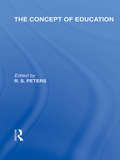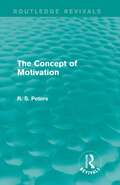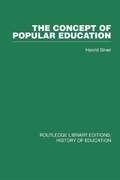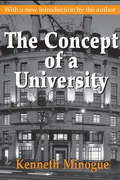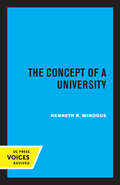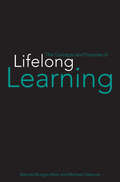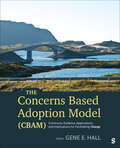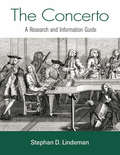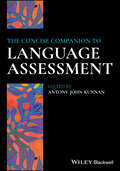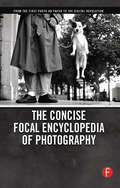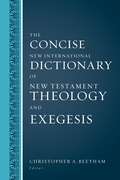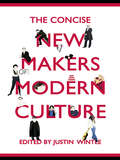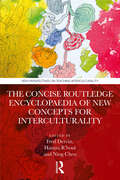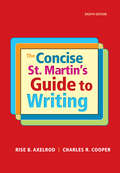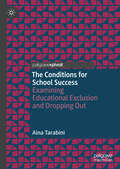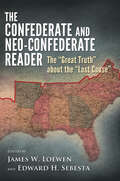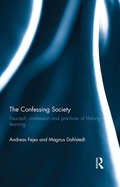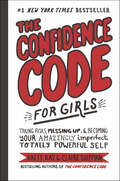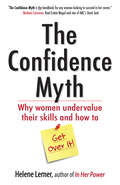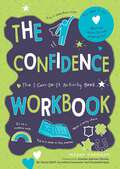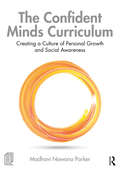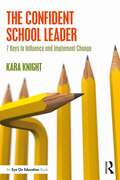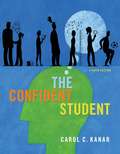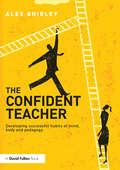- Table View
- List View
The Concept of Education (International Library of the Philosophy of Education Volume 17)
by R. S. PetersA series of public lectures given at the Institute of Education, University of London provides the nucleus around which this collection, originally published in 1967, is gathered. This collection provides comprehensive coverage of a complex theme which will be of interest to those involved in the fields of philosophy and education alike. Topics covered include:the logical and psychological aspects of learning, the concept of play, rule and routines, teaching and training, philosophical models of teaching.
The Concept of Motivation (Routledge Revivals: R. S. Peters on Education and Ethics)
by R. S. PetersFirst published in 1958 with a second edition in 1969, The Concept of Motivation looks philosophically and psychologically at the idea of motivation in order to explain human behaviour. Chapters cover types of explanation in psychological theories, motives and motivations, a look at Freud’s theory, drive theories, and regression to hedonism. Despite its original publication date, the book explores topics which are still of great interest to us today. ‘This is indeed an outstanding book; perhaps the best study in philosophical psychology to appear since Ryle and a work which […] will remain a classic for many years’ Philosophy
The Concept of Popular Education
by Harold SilverOriginally published 1965. This reprints the 1977 edition which included a new introduction. From the starting point of "popular" charity education, the book traces the dynamic of ideological and social change from the 1790s to the 1830s in terms of attitudes to education and analyzes the range of contemporary opinions on popular education. It also examines some of the channels through which ideas about education were disseminated and became common currency in popular movements.
The Concept of a University
by Kenneth MinogueTaking on the challenge of the postmodernists of politics, Kenneth Minogue argues forcefully and persuasively that the current dominant philosophies of education rest upon a mistake. The fashionable belief that the university is society's handmaiden is confronted by a view of the university as an institution with an independent vitality and function. Minogue at one and the same time reminds us of the sources of admiration for university life in the medieval world, and how it rested squarely on its essential autonomy from the very social pressures that have come to define the modern university. The Concept of a University traces many confusions imposed by political ideology to a failure to distinguish academic inquiry from other kinds of intellectual activity, such as journalism, religious proselytizing, and high quality propaganda. Minogue holds that where the university lacks a clear sense of the difference between the academic and the pragmatic, its vitality is sapped by conflicting purposes.Much of the present debate about the crisis in universities rests upon a fundamental error of trying to fit them into some scheme of social functions. Minogue's analysis breaks through much muddled thinking on this subject, presenting instead a coherent, relevant, and stimulating approach to higher education.In a new introduction, Minogue tells us "we have become frightfully tolerant. Anyone can become anything, and we all belong to the one practical world of churning problems and solutions. There is no doubt that a new world is being born. It seems to be a world that will have little place for the disinterested pursuit of truth. A great deal of old fashioned scholarship survives--partly by silence, cunning and exile' --in the universities' of the present day, but little relationship remains between what we used to call universities' and the things called by that name today." Kenneth Minogue is professor emeritus of polit
The Concept of a University
by Kenneth R. MinogueThis title is part of UC Press's Voices Revived program, which commemorates University of California Press’s mission to seek out and cultivate the brightest minds and give them voice, reach, and impact. Drawing on a backlist dating to 1893, Voices Revived makes high-quality, peer-reviewed scholarship accessible once again using print-on-demand technology. This title was originally published in 1973.
The Concepts and Practices of Lifelong Learning
by Michael Osborne Brenda Morgan-KleinThis textbook gives a wide-ranging, research-informed introduction to issues in lifelong learning across a variety of educational settings and practices. Its very accessible approach is multi-disciplinary drawing on sociology and psychology in particular. In addition, issues are discussed within an international context. While there has been a proliferation of texts focussing on particular areas of practice such as higher education, there is little in the way of a broad overview. Chapters one to four introduce various conceptions of lifelong learning, the factors that impinge on learning through the life course, and the social and the economic rationale for lifelong learning. Chapters five-ten consider the varied sites of lifelong learning, from the micro to macro (from the home to the region to the virtual). Chapter eleven draws the strands together in the context of turbulence and continuing transition in personal and work roles, and against the background of future technological development. This timely overview will be relevant to education and training professionals, education studies students and the general reader.
The Concerns Based Adoption Model (CBAM): Constructs, Evidence, Applications, and Implications for Facilitating Change
by Gene E. HallChange can be interesting, challenging, easy, difficult, and sometimes fun. The Concerns Based Adoption Model (CBAM): Constructs, Evidence, Applications, and Implications for Facilitating Change, edited by Gene E. Hall, a key originator of CBAM, uses a research-tested model to introduce students in education to ways of thinking, strategies, and steps that leaders can take to facilitate and advance change processes in their own schools. The primary focus of this book and method is on understanding the thoughts, perceptions, feelings, and concerns of the people who are engaged with change and finding systematic ways to address them. This edited volume provides clear instruction from researchers who know CBAM best, experiences and case studies from a wide variety of educational settings, and strong pedagogy so readers can learn CBAM and apply this model to their educational systems.
The Concerns Based Adoption Model (CBAM): Constructs, Evidence, Applications, and Implications for Facilitating Change
by Gene E. HallChange can be interesting, challenging, easy, difficult, and sometimes fun. The Concerns Based Adoption Model (CBAM): Constructs, Evidence, Applications, and Implications for Facilitating Change, edited by Gene E. Hall, a key originator of CBAM, uses a research-tested model to introduce students in education to ways of thinking, strategies, and steps that leaders can take to facilitate and advance change processes in their own schools. The primary focus of this book and method is on understanding the thoughts, perceptions, feelings, and concerns of the people who are engaged with change and finding systematic ways to address them. This edited volume provides clear instruction from researchers who know CBAM best, experiences and case studies from a wide variety of educational settings, and strong pedagogy so readers can learn CBAM and apply this model to their educational systems.
The Concerto: A Research and Information Guide (Routledge Music Bibliographies #Vol. N28)
by Stephan D. LindemanTwelve-tone and serial music were dominant forms of composition following World War II and remained so at least through the mid-1970s. In 1961, Ann Phillips Basart published the pioneering bibliographic work in the field.
The Concise Companion to Language Assessment
by Antony John KunnanThe Concise Companion to Language Assessment provides a state-of-the-art overview of the crucial areas of language assessment, teaching, and learning. Edited by one of the foremost scholars in the field, The Concise Companion combines newly commissioned articles on innovations in assessment with a selection of chapters from The Companion to Language Assessment, the landmark four-volume reference work first published in 2013. Presented in eight themes, The Concise Companion addresses a broad range of language assessment methods, issues, and contexts. Forty-five chapters cover assessment conceptualization, development, research, and policy, as well as recent changes in language assessment technology, learning-oriented assessment, teacher-based assessment, teacher assessment literacy, plurilingual assessment, assessment for immigration, and more. Exploring the past, present, and future possibilities of the dynamic field, The Concise Companion to Language Assessment: Contains dedicated chapters on listening, speaking, reading writing, vocabulary, pronunciation, intercultural competence, and other language skills Describes fundamental assessment design and scoring guidelines, as well as advanced concepts in scenario-based assessment and automated performance scoring Provides insights on different assessment environments, such as classrooms, universities, employment, immigration, and healthcare Covers various qualitative and quantitative research methods, including introspective methods, classical reliability, and structural equation modeling Discusses the impacts of colonialism and discrimination on the history of language assessment Explores the use of AI in writing evaluation, plagiarism and cheating detection, and other assessment contexts Sure to become a standard text for the next generation of applied linguistics students, The Concise Companion to Language Assessment is an invaluable textbook for undergraduate and graduate courses in applied linguistics, language assessment, TESOL, second language acquisition, and language policy.
The Concise Focal Encyclopedia of Photography: From the First Photo on Paper to the Digital Revolution
by Michael R. Peres Mark Osterman Grant B. R Omer Nancy M. Stuart J. Tomas LopezDefining photography is impossible. Revealing it is another matter, and that's what The Concise Focal Encyclopedia of Photography does,with each turn of the page.History: The technical origins and evolution of photography are half of the story. The other half consists of the ways that cultural forces have transformed photography into a constellation of practices more diverse than any other mode of representation. Photographers can tell a more in-depth story through a photo like Dorothea Lange's "Migrant Mother" than a journalist ever could with the written word alone.Major themes and practitioners: Over 25 entries, many with supporting illustrations,examine the figures, trends, and ideas that have contributed most heavily to the history and current state of photography.Contemporary issues: The issues influencing photography today are more complex than at any other time in its history. Questions of ethics, desire, perception, digitization, and commercialization all vie for attention. Hear what the experts have to say about crucialissues such as whether or not the images we take today will last the test of time, and if so, how?When material is covered this skillfully, "concise" is no compromise. The Concise Focal Encyclopedia of Photography is packed with useful information, compellingideas, and - best of all - pure pleasure.
The Concise New International Dictionary of New Testament Theology and Exegesis
by ZondervanThe Exegesis Quick-Reference Tool Every Pastor, Teacher, Student, and Scholar NeedsThe Concise New International Dictionary of New Testament Theology and Exegesis (CNIDNTTE) by Christopher A. Beetham is a significant resource for those looking for a quick-reference guide to aid in exegesis and interpretation. It retains all the essentials of the monumental and magisterial New International Dictionary of New Testament Theology and Exegesis edited by Moises Silva, bringing together its most important elements into one accessible volume. This reference includes the most vital, relevant information needed to delve deep into the study of the Greek words used in Scripture for study of the New Testament--its texts and theology.This volume offers a wealth of background and information on the meaning of Greek words in the New Testament, as well as related usage in classical Greek sources, the Greek Old Testament (Septuagint), and extrabiblical Second Temple Jewish literature. This significant tool offers the following features:All the nearly 800 entries covering over 3,000 Greek words found in the full edition are included and presented in the same order and arrangementRetains approximately 60 percent of the original edition, with the emphasis now on synchronic word study and usage in the Greek Old Testament, extrabiblical Second Temple literature, and especially the New TestamentThe unique arrangement according to Greek words and use of English concepts is retained from the full edition and allows all users to access Greek terms regardless of their level of competence in Greek.This edition retains the significant semantic-domain tool that directs the reader to all the Greek words that have something to do with a particular English word or concept. For example, under the English words "Resurrection," there is a list of four Greek words that are related to that topic.Discussions reflect the latest in modern scholarshipBibliographies retain essential references to other standard lexicons and theological dictionariesThe Concise New International Dictionary of New Testament Theology and Exegesis is the ideal tool for pastors, Bible teachers, students, and scholars engaging in exegesis. It is packed with the essential information needed to study the New Testament.
The Concise New Makers of Modern Culture
by Justin WintleA Who's Who of Western culture, from Woody Allen to Emile Zola... Containing four hundred essay-style entries, and covering the period from 1850 to the present, The Concise New Makers of Modern Culture includes artists, writers, dramatists, architects, philosophers, anthropologists, scientists, sociologists, major political figures, composers, film-makers and many other culturally significant individuals and is thoroughly international in its purview. Next to Karl Marx is Bob Marley, with John Ruskin is Salman Rushdie, alongside Darwin is Luigi Dallapiccola, Deng Xiaoping rubs shoulders with Jacques Derrida as do Julia Kristeva and Kropotkin. With its global reach, The Concise New Makers of Modern Culture provides a multi-voiced witness of the contemporary thinking world. The entries carry short bibliographies and there is thorough cross-referencing as well as an index of names and key terms.
The Concise Routledge Encyclopaedia of New Concepts for Interculturality (New Perspectives on Teaching Interculturality)
by Fred Dervin Ning Chen Hamza R’boulThis groundbreaking encyclopaedia presents 74 innovative concepts selected and elaborated by multilingual scholars, enriching critical discussions of the notion of interculturality in global scholarship.Many scholars are currently attempting to un-re-think and decolonize interculturality in different fields of research. Although ideas are critiqued and revised, this is happening in very similar linguistic terms as before. These potential attempts to decentre and decolonize could then be put into question. This book argues that knowledge production and negotiation should be exercised through alternative linguistic strategies, not for the sake of sounding different, but to advance new ways of defining, knowing and problematizing. The need to develop concepts in English and other languages is thus promoted in this encyclopaedia.Students, scholars and teachers with a sound background in intercultural studies will benefit most from the book. It will also appeal to anyone wishing to explore new ways of thinking, researching, speaking and writing about interculturality.
The Concise St. Martin’s Guide to Writing (Eighth Edition)
by Rise B. Axelrod Charles R. CooperThe new Concise St. Martin's Guide to Writing provides streamlined coverage of the six most commonly assigned genres in first-year composition, including remembering events, writing profiles, explaining concepts, arguing a position, proposing a solution, and justifying an evaluation. The Concise Guide leads students through the writing process: Guides to Reading equip students to analyze a genre's basic features, and Axelrod and Cooper's distinctive Guides to Writing help students apply their analysis of reading to the development of their own writing projects. With a new introductory chapter ("Composing Literacy") on writing a literacy narrative, a new assignment chapter on analyzing and synthesizing opposing arguments, and a new chapter on analyzing and composing multimodal texts, the Concise Guide helps students accomplish their writing goals from start to finish.
The Conditions for School Success: Examining Educational Exclusion and Dropping Out
by Aina TarabiniThis book analyses the role played by schools themselves in the high rates of educational exclusion and dropping out that affects many European education systems. The author frames the analysis according to three aspects of justice – redistribution, recognition and care – to explore both how teachers explain and react to the processes of educational failure and early school leaving, and how young people make sense and cope with the same failures. Using extensive qualitative data from schools in the Barcelona area, the author analyses the impact of school segregation, methods for managing diversity and teaching expectations: and subsequently how they can contribute to the production and reproduction of the risks of failure and ESL in contemporary education systems. This book will be of interest and value to students and scholars of educational exclusion, as well as school leaders.
The Confederate and Neo-Confederate Reader: The Great Truth about the Lost Cause
by James W. Loewen and Edward H. SebestaMost Americans hold basic misconceptions about the Confederacy, the Civil War, and the actions of subsequent neo-Confederates. For example, two thirds of Americans—including most history teachers—think the Confederate States seceded for “states' rights.” This error persists because most have never read the key documents about the Confederacy. These documents have always been there. When South Carolina seceded, it published “Declaration of the Immediate Causes Which Induce and Justify the Secession of South Carolina from the Federal Union.” The document actually opposes states' rights. Its authors argue that Northern states were ignoring the rights of slave owners as identified by Congress and in the Constitution. Similarly, Mississippi's “Declaration of the Immediate Causes. . .” says, “Our position is thoroughly identified with the institution of slavery—the greatest material interest of the world.” Later documents in this collection show how neo-Confederates obfuscated this truth, starting around 1890. The evidence also points to the centrality of race in neo-Confederate thought even today and to the continuing importance of neo-Confederate ideas in American political life. The 150th anniversary of secession and civil war provides a moment for all Americans to read these documents, properly set in context by award-winning sociologist and historian James W. Loewen and coeditor, Edward H. Sebesta, to put in perspective the mythology of the Old South.
The Confessing Society: Foucault, Confession and Practices of Lifelong Learning
by Magnus Dahlstedt Andreas Fejes"I highly appreciate the quality of Fejes’ and Dahlstedt’s research and writing. They manage to present in a comprehensible way some essential concepts of Foucault that help us to understand better what practices of lifelong learning, in a broad sense, are emerging nowadays in advanced liberal societies. In doing so, they contribute to the renewal of critical thinking in education. They convince me that such renewal is important and necessary… and I think both theoreticians and practitioners of lifelong learning will equally recognize and value this analysis, particularly also, because they present a good mix of theory and practice." -Professor Danny Wildemeersch Today, people are constantly encouraged to verbalise and disclose their "true" inner self to others, whether on TV shows, in newspapers, in family life or together with friends. Such encouragement to disclose the self has proliferated through discourses on lifelong learning through which each citizen is encouraged to become a constant learner. The Confessing Society takes a critical stance towards the modern relentless will to disclose the self and argues that society has become a confessing society. Drawing on Foucault’s later work on confession and governmentality, this book carefully analyses how confession operates within practices of lifelong learning as a way to shape activated and responsible citizens and provides examples of how it might be possible to traverse the confessional truth of the present time. Chapters include: Reflection and Reflective Practices Deliberation and Therapeutic Intervention Lifelong Guidance Medialised Parenting This controversial book is international in its scope and pursues current debates regarding trans-national policy and to research discussions on education, lifelong learning and governance, and it will provoke lively debate amongst educational practitioners, academics, postgraduate and research students in education and lifelong learning in Europe, North America and Australasia.
The Confidence Code for Girls: Taking Risks, Messing Up, & Becoming Your Amazingly Imperfect, Totally Powerful Self
by Claire Shipman Katty Kay JillEllyn RileyNew York Times, USA Today, and Wall Street Journal Bestseller!Girls can rule the world—all they need is confidence. This empowering, entertaining guide from the bestselling authors of The Confidence Code gives girls the essential yet elusive code to becoming bold, brave, and fearless. Packed with graphic novel strips; appealing illustrations; fun lists, quizzes, and challenges; and true stories from tons of real girls, The Confidence Code for Girls teaches girls to embrace risk, deal with failure, and be their most authentic selves.It’s a paradox familiar to parents everywhere: girls are achieving like never before, yet they’re consumed with doubt on the inside. Girls worry constantly about how they look, what people think, whether to try out for a sports team or school play, why they aren’t getting “perfect” grades, and how many likes and followers they have online.Katty Kay and Claire Shipman use cutting-edge science and research, as well as proven methods of behavioral change, to reach girls just when they need it the most—the tween and teen years.Plus don't miss Living the Confidence Code! Packed with photos, graphic novel strips, and engaging interviews, Living the Confidence Code proves that no matter who you are, or how old you are, nothing is out of reach when you decide to try.
The Confidence Myth: Why Women Undervalue Their Skills, and How to Get Over It
by Helene LernerNot only do we need more female leaders at the top, but we need more women at all levels of business, government, and nonprofits to step up—there's no time to waste. The problem, says Helene Lerner, isn't so much that women lack confidence but that they misunderstand what confidence really is. True confidence isn't fearlessness; it's having the courage to jump in even when your knees are shaking. Any woman who waits until she feels 100 percent confident before offering a big idea or asking for a raise or promotion will never get anywhere. Drawing on her own and other female leaders' experiences, as well as on her survey of over 500 working women, Lerner lays out practical strategies for beating this confidence myth and overcoming obstacles like gender bias. The book features dozens of Confidence Sparks, simple but powerful exercises and techniques that can catapult anyone's career to the next level.
The Confidence Workbook: The I-Can-Do-It Activity Book
by Imogen HarrisonEveryone feels nervous sometimes - perhaps because we're trying something new, or because we worry we're not good enough.The Confidence Workbook is here to help by showing you how to build your confidence, offering creative ways to develop your strengths, such as speaking up and believing in yourself when you need to say "I can!"
The Confident Minds Curriculum: Creating a Culture of Personal Growth and Social Awareness
by Madhavi Nawana ParkerThe Confident Minds Curriculum provides a simple and practical approach to culture change in schools, health care settings and organisations working with young people. Refraining from focusing solely on young people’s growth, the curriculum provides logical and practical support to the people and systems in their environment to enable and maximise growth for positive and connected communities. Crucial mindsets for healthy relationships, empathy, compassion, problem-solving, emotional intelligence and well-being are broken down into bite-size, teachable chunks. All blend together exquisitely to help people look at themselves and others with confidence, gratitude and compassion. Easily applied to individuals, targeted groups and whole classes to meet the social emotional learning (SEL) or well-being curriculum, this book provides a guiding light for young people and their supporters to develop what is necessary for socially and emotionally intelligent environments. Aimed primarily at the middle years (8–14), it is easily adaptable for younger and older students. Through role plays, discussions, journaling and practical activities each new mindset is divided into several lessons that teach individual learning components of new ways of thinking, feeling and behaving. The Confident Minds Curriculum will appeal to teachers, educators and health professionals searching for a whole school or organisational approach to social emotional learning, well-being, compassion and personal growth. It is also an essential resource for homes where parents and carers can help further develop life skills that build character and optimism so their family can approach life with greater confidence.
The Confident School Leader: 7 Keys to Influence and Implement Change
by Kara KnightThis exciting resource will help you build confidence in yourself as an educational leader. Written by an award-winning leader, this book encourages readers to use research-based strategies to lead in meaningful, authentic ways that make the greatest impact on students and staff members each day. Full of real-life stories and key takeaways, readers will walk away from this book with a better plan for reinvigorating their leadership skills and awaken the confidence within. Whether you are a future administrator, a new principal, or a veteran administrator, the seven key leadership themes in this book will guide you in influencing and implementing change to effectively lead your school.
The Confident Student 8th Edition
by Carol C. KanarThe Confident Student, Eighth Edition helps both the first-time college student and the older returning student make the transition to academic life and work. Updated Design, Thinking with Bloom, Get Connected, A more intentional Focus on Reflective Thinking, New Material in several Chapters are unique features of this book.
The Confident Teacher: Developing successful habits of mind, body and pedagogy
by Alex QuigleyThe Confident Teacher offers a practical, step-by-step guide to developing the habits, characteristics and pedagogy that will enable you to do the best job possible. It unveils the tacit knowledge of great teachers and combines it with respected research and popular psychology. Covering topics such as organisation, using your body language effectively, combatting stress, managing student behaviour, questioning and feedback, and developing confident students, it shows how you can build the confidence and skill to flourish in the classroom. This book will be an essential resource for all qualified and trainee teachers wanting to reach their full potential in this challenging but rewarding profession.
